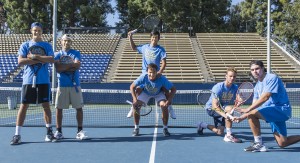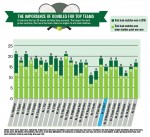Grant Chen remembers the 2005 NCAA championship.
Chen, then a team manager for the UCLA men’s tennis team, watched as the Bruins were destroyed by the Baylor Bears in doubles, falling into an early 1-0 hole before singles play. Undeterred, the Bruins battled back to win four singles matches and claim the national title.
Those 2005 Bruins were one of five teams in the past 10 years to overcome a lost doubles point in the national championship.
The stats beg the question: Just how important is the doubles point in NCAA men’s tennis? With the doubles point worth just one point and the singles matches worth six, should coaches disregard practicing doubles to focus on the six singles points?
Chen, now an assistant coach for UCLA, said no.
“Doubles is an absolute essential,” he said.
His statement is backed by statistics. While the doubles point hasn’t factored into the NCAA title game much, it has played a greater role in the preceding NCAA tournament matches.

Daily Bruin Sports looked at the past 10 years of NCAA tournament match data from the Round of 16 through the final, and discovered an increased correlation between doubles victory and match victory in the earlier rounds.
Aside from the national championship, every round displays similar results. The team that won the doubles point went on to win the dual match 77.3 percent of the time.
In the Round of 16, the team that won the doubles point also won the match 78.75 percent of the time. In the quarterfinals and semifinals, that number increases to 80 percent.
The high value of the doubles point in NCAA tournament matches reveals the psychological significance of the doubles point itself. With doubles always coming before singles, the winner of that point is able to capture the early momentum.
“A good doubles match will give us confidence going into singles,” said sophomore Joseph Di Giulio.
But the doubles winners cannot get too confident, Chen said.
“Whether you lose the point or win the point, you’ve got to be able to get past it, because it’s not the end of the match,” Chen said. “Regardless of whether you won or lost the doubles point, you still have to win singles. It just makes your life a little easier.”
Of course, part of the impressive winning percentage of teams that win doubles comes from the fact that the better team typically wins doubles. Chen said a lot of the skills from doubles are useful in singles, further encouraging coaches to implement doubles practice.
Chen pointed to junior co-captain Karue Sell, whose experience playing doubles has improved his singles game significantly.
“Karue has become more versatile,” Chen said. “His singles game has added a whole other dimension that he used to not have. He used to be a little bit more of a baseliner – forehands and backhands. Now he’ll come in, now he’ll approach. He’ll serve and volley.”
Coming into the net and attacking the opponent with volleys – an important asset in doubles – is a skill that coach Billy Martin said is underdeveloped in youth tennis.
“The problem right now in junior tennis is doubles is not focused on, so a lot of kids don’t even want to play doubles,” Martin said. “And when they do play doubles, they’re sort of playing a singles strategy while playing doubles – they’re not playing good doubles. It’s probably the thing that I think the kids improve upon the most when they get to college, because some of them have no clue about how to move with their partner.
Last year – according to Martin – when the Bruins’ singles play was stronger, seven of their 26 wins came after losing the doubles point.
But this year, UCLA has won just one match after losing the doubles point. In the 15 matches for which they have won doubles, the Bruins are 13-2, underscoring the importance of winning that first point. In the six matches for which they have lost doubles, they are just 1-5.
However, Martin said the team still spends more time on singles.
“We always practices singles. I think that’s a constant. Even if we are working on doubles that day, we will always finish off with a set of singles at the end of practice,” Martin said. “We probably practice doubles a few times a week. We can’t do everything everyday. You just can’t.”
Martin said he hopes he has struck the right balance in how much he has focused on doubles. Come NCAA tournament time, he will likely find out.
